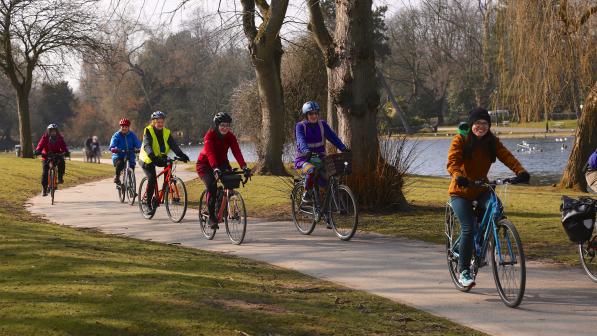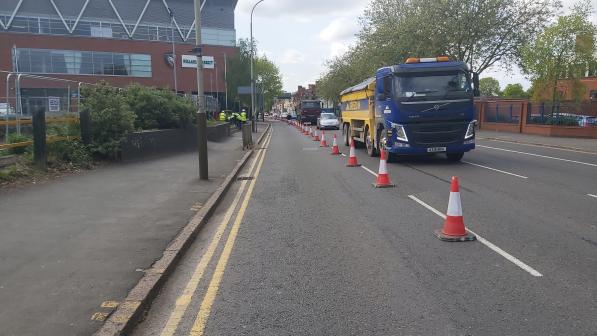Install lockdown cycling measures in Scotland, urges Cycling UK

Cycling UK has written to council leaders in Scotland providing a guide on how councils can put in place measures during the coronavirus lockdown that are quick to set up and cost very little.
Jim Densham, Cycling UK’s campaigns and policy manager for Scotland said:
“Glasgow and Edinburgh councils are leading the way in Scotland, by being proactive in their measures against Covid-19. Introducing measures to make cycling and walking safer and social distancing easier is vital, for now and in the future when lockdown restrictions are relaxed.
“The reality is we’re unlikely to have a vaccine for quite some time, but we will still need to get about and take exercise. Social distancing is likely to be the 'new normal' in the coming months – that means people need more space to keep safe.
“Cycling UK’s guide will help Scottish councils be proactive in keeping people safe in a cost and resource efficient manner.”
Measures Cycling UK recommends councils adopt include:
- Creating temporary and wider cycle lanes using cones and planters
- Widening footpaths
- Stopping rat runs by closing residential streets
The charity says by putting these in place councils will not just be making the roads safer for key workers on their way to work, families taking their daily exercise or individuals running vital errands, but will also make it easier for everyone to practice social distancing.
Cycling UK has also written to council leaders in England and Wales, urging them to follow the examples of Brighton and Cardiff which have both already put measures in place to support cycling and walking.
Introducing measures to make cycling and walking safer and social distancing easier is vital, for now and in the future when lockdown restrictions are relaxed.
Jim Densham, Cycling UK
Will Butler-Adams, CEO of Brompton Bicycle, backs the guide and said:
“Around us, global cities are taking the lead in repurposing space for cycling and walking. We need the UK to be proactive, especially as increased cycling and walking, post lockdown, will help mitigate against a second wave of infection. If cities don’t act now, it’s very likely that they will discover a huge increase in private car usage post-lockdown, with large impacts on health, air quality and productivity.
“We’d encourage everybody to write to their elected representatives and make the case and demand clear for cycling and walking during and after the pandemic.”
Cycling UK has set up a simple online tool for people who want to see improved facilities for social distancing in their neighbourhood which allows them to contact their council leaders and local councillor.
Mr Densham said:
“If you want improved conditions on your local roads which will allow you to practise social distancing and be safer from other road traffic then tell your council. They have a chance to make a difference right now, if they’re prepared to grasp it.”
Dr Rachel Lee, Policy and Research Manager, Living Streets supporting the campaign said:
“This pandemic is making us all realise how much public space is given over to individual car use rather than walking and cycling. Filtered neighbourhoods, banning cars from certain roads and tackling pavement parking can all help make our daily exercise easier and safer.
“Towns and cities worldwide are starting to reallocate road space so people can carry out their daily exercise at a safe distance from others and free from road danger. Now we can start to follow their lead. With National Walking Month around the corner in May, there's never been a better time to get people moving towards active travel."
Notes to editors
- Cycling UK, the national cycling charity, inspires and helps people to cycle and keep cycling, whatever kind of cycling they do or would like to do. Over a century’s experience tells us that cycling is more than useful transport; it makes you feel good, gives you a sense of freedom and creates a better environment for everyone. www.cyclinguk.org
- Cycling UK’s online tool can be accessed at: https://action.cyclinguk.org/page/59646/action/1?ea.tracking.id=PR
- WHO guidance states: “Whenever feasible, consider riding bicycles or walking. This provides physical distancing while helping you to meet the minimum requirement for daily physical activity, which may be more difficult due to increased teleworking, and limited access to sport and other recreational activities.” https://who.canto.global/pdfviewer/viewer/viewer.html?share=share%2Calbum%2CU6GDM&column=document&id=q3v02qdsh114763ffe3apo4s2p&suffix=pdfIn
- Edinburgh and Glasgow councils are saying they are looking into temporary lanes and measures to provide space for cyclists and walkers, as reported in the Scotsman: https://www.scotsman.com/news/transport/pop-cycle-lanes-and-widened-pavements-edinburgh-and-glasgow-2545363
- In Brighton road space along part of the sea front is being closed to motor vehicles and opened up to cycling and walking: https://new.brighton-hove.gov.uk/news/2020/madeira-drive-first-road-be-allocated-walkers-and-cyclists
- In Cardiff a 20mph limit, restricted parking and a one way system to discourage trips by car in a key location has been introduced: https://www.cardiffnewsroom.co.uk/releases/c25/23662.html?utm_source=Twitter&utm_medium=social&utm_campaign=SocialSignIn&utm_content=COVID-19
Press contact information
For more information contact the national Cycling UK Press Office on 01483 238 315, 07786 320 713 or email [email protected]








